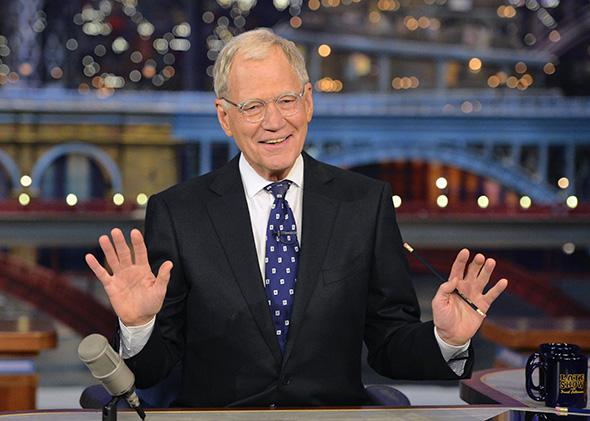Rather than spend his final hour as host of the Late Show with David Letterman collecting plaudits and remembering his triumphs, David Letterman used his farewell as an hour-plus-long exercise in self-deprecation. It began with his cold open, which ran tape of several former U.S. presidents saying “Our long national nightmare is over,” concluding with President Obama saying: “Our long, national nightmare is over. Letterman is retiring.” Letterman, standing next to him, said “You’re just kidding, right?” Obama shrugs.
That shrug set the tone for the rest of the show, in which Letterman celebrated an imaginary world where nobody actually likes him or his confusing, alienating show. His monologue was filled with jokes along those lines. There was a bit about former Cuban castaway Elian Gonzales: “The kid is 21 years old. And yesterday he announced that he wants to come back to America. Now, my question to you is: Should I take this personally?” They aired a bit from the set of Wheel of Fortune, with a contestant solving a puzzle where the answer was “Good Riddance to David Letterman.”
The show featured a wonderful montage of Letterman interviewing children over the years, premised on all the children finding him weird and annoying. “You are not, you are not, you are not funny,” one kid sang to Letterman to the tune of “Jingle Bells.”
Letterman made much of the fact that he had hosted more than 6,000 shows during his late-night tenure. “Earlier today, we got a call from Stephen Hawking,” Letterman said in his monologue. “He ran the numbers, and he said, it works out to about eight minutes of laughter.” Later, near the end of the show, Letterman would claim that “we’ve done over 6,000 shows. I was here for most of them, and I can tell you, a pretty high percentage of those shows just absolutely sucked.”
The final Top Ten list—Top Ten Things I’ve Always Wanted to Say to Dave—was delivered by 10 different celebrities, each of whom walked out and delivered a line that cut Letterman down in one way or another. Alec Baldwin delivered No. 10: “Of all the talk shows, yours is most geographically convenient to my home.” Jerry Seinfeld gave No. 7: “I have no idea what I’ll do when you go off the air. You know, I just thought of something … I’ll be fine.” And then, of course, there was Jim Carrey at No. 6: “Honestly, Dave, I’ve always found you to be a bit of an over-actor.”
Watching the Late Show finale, I couldn’t help thinking of a segment from the final episode of the Larry Sanders Show, the 1990s HBO series about a fictional late-night talk show—in my opinion the greatest sitcom of all time. The Sanders series finale depicted the finale of the show’s in-world talk show, which was also called the Larry Sanders Show. Jim Carrey appeared as one of the show’s final guests, and Carrey came out with lavish praise: “It’s an honor for me to be here on this historic night. Really, truly,” he says, and proceeds to run through the audience singing an energetic song begging Sanders not to retire.
At the commercial break, though, Carrey lets his real feelings be known: “Let’s just cut the crap, Larry, OK? You never liked my work. Not until I got hugely famous. I’m here for three good reasons: Last show; big ratings; movie coming out. Bim, bam, boom. Otherwise I’d be sitting at home watching Nightline.” What people say when the cameras are on and what they say when no one is watching are often entirely different things.
One of the orienting fictions of late-night television is that celebrities are all friends with one another, that everyone gets along and respects each other’s work. The truth is likely quite different. But Letterman had no patience for such phoniness. So the spectacle of celebrities paying tribute to him by bashing him made for an oddly sweet and fitting theme for the finale of the Late Show. In a sense, it was the theme of Letterman’s entire late-night tenure. David Letterman built his career on his reluctance to conform to traditional show-business standards and practices, his distaste for traditional show-business glad-handing. Letterman was a show by and for the weirdos.
My favorite thing from the show—and probably the strangest thing from the show—was when Letterman introduced his family, and then proceeded to introduce his son’s friend, because why not? “Harry wanted me to introduce his buddy Tommy Roboto,” Letterman said, as the camera showed the young, big-eyed Mr. Roboto, beaming bashfully as the crowd applauded. “Tommy, right there. There’s Tommy. Go get ’em, son!” It was so stupid. I laughed out loud.
And Letterman chuckled, too, as if he couldn’t believe how ridiculous that bit was. And that was the most Letterman moment of the show, to me: that momentary acknowledgement that if nobody really likes you anyway, then you might as well just try to make yourself laugh, and if other people want to come along for the ride, great. You can’t please everyone, so you might as well please yourself.
Read Slate’s package on the end of an era in late-night TV, Last Laugh.
